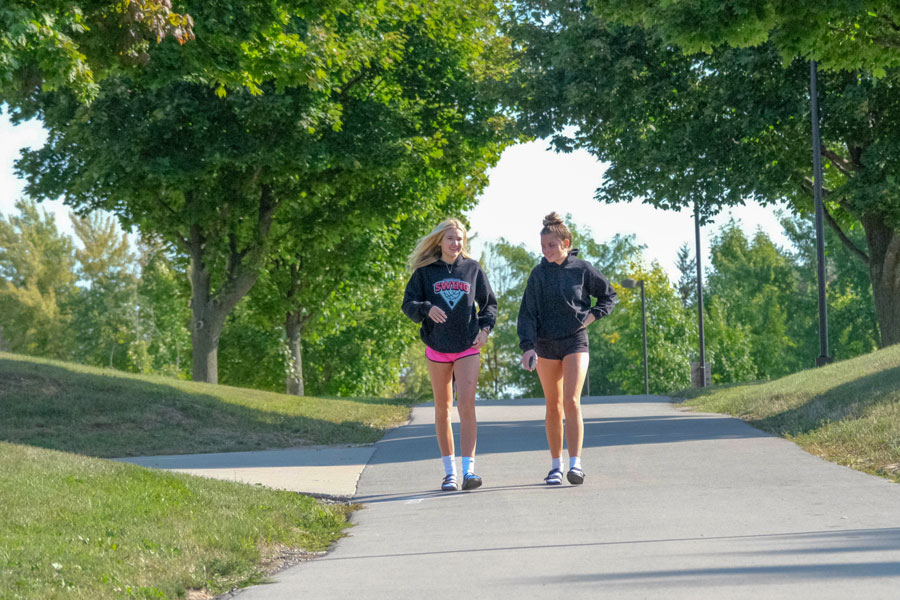Safe Walk Program
It's safer to walk if You're in a flock
If you find yourself alone, use our Safe Walk Program to get where you are going.
Your safety is our priority. Feeling safe in important. If you are alone, our university police officers are available 24 hours a day, 7 days a week to walk with you to your destination on campus. This is a free service to everyone in the UW-Green Bay community.

First come, First serve
While safe walks are available 24/7, if university police officers are helping others, you may need to wait. Safe walks are provided on a first come, first served basis.
Have an urgent safety concern?
If you have an immediate safety concern when calling, please tell us when you call so that our officer can respond accordingly or call 911.
What do they need to know?
Tell the dispatcher your name, where you are, what you are wearing (for identification purposes) and your phone number (in case we need to call you). Stay where you are.
What if my situation changes?
If your needs change prior to the police officer arriving, call back and let us know.

Help Keep everyone safe
If you see a streetlight out on campus, report it.
Streetlights can help you feel and be safer at night, but if they're not working, they're not helping. To report a streetlight outage or other safety concern on campus, go to the UW-Green Bay's Safety and Environmental Management website to complete an online safety concern report.
Maintaining Personal Safety
Here are some tips help you keep safe at college, in the community and in your future.
- Always walk in groups.
- Stick to well-lit and brush-free paths.
- Stay alert and be aware of your surroundings.
- Report anything suspicious to University Police.
- Invest in self-defense devices or take a self defense course.
- University Police conduct free training periodically throughout the year.
- Carry a whistle to alert people of a potential problem.
- Don't flash (or carry) large amounts of cash.
- Keep jewelry out of sight.
- Carry your purse close to your body.
- Use ATMs in the daytime, if possible. Have your card in hand and don't approach the machine if you're uneasy about people nearby.
- Have your car keys or key card in hand before you reach the door.
Walking & Running on Campus
Whether you are walking or running on one our campus trails, sidewalks or sharing the roads with cars and trucks, you can do some things to take personal responsibility for your own safety. Here are some tips that could keep you safer:
- Run or walk facing traffic and obey pedestrian safety laws.
- Stay to the left side of the roadway as far as practical. This allows you to see approaching vehicles or people and allows you time to respond if needed.
- Carry a phone for emergencies, but never walk or run while texting or talking on the phone. If you must use the phone, stop and move out of the way of others. Never cross the street while using any electronic device.
- Do not wear headphones or earbuds. The tradeoff for the music is diminished personal safety especially on an isolated road, walkway or trail.
- Walk with a friend. Walking with a friend is a great motivator and makes the time more enjoyable. More importantly, there is always safety in numbers.
- Let someone know where you are going and when to expect you back. That way, if you do not arrive back on time someone knows where to look for you.
- Have a plan. Taking personal responsibility for your safety means thinking about how you will respond in a difficult situation. There is a difference between feeling safe and being safe. Having a plan helps you be safe and feel safe.
- Never let your guard down even if you have followed the same route hundreds of times.
- Wear light colored or reflective clothing to increase your visibility to drivers. During hours of diminishing natural lighting, using flashlights or other lights is a good idea.
- Dress to avoid tick bites. When using the trails, cover up with long sleeves, long pants and wear a hat covering your ears and hair; light-colored clothing makes it easier to see ticks before they embed.
- Vary your route. It prevents anyone else from predicting your whereabouts or routine.
- Be aware of your surroundings. Watch for hazards (ice, water, bike riders) in your path.
- Know where you are. Be prepared to accurately provide your location if you call for help. For example: The Arboretum trails have colored posts to help identify your location.
- See something, say something. Report any suspicious activity to University Police by calling 920-465-2300.

Find Support
If this is a time-sensitive concern, call us at 920-465-2300. For all other inquiries, contact our team.